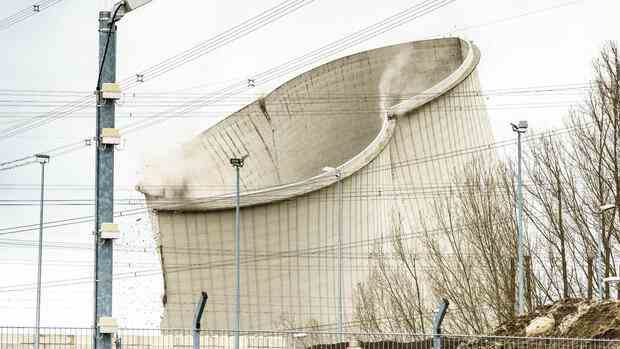The last nuclear power plants in Germany are to be shut down in mid-April. The CDU is against it.
(Photo: dpa)
Berlin Within the CDU, the debate about the future of nuclear energy flares up again. The state chairman of the CDU in Rhineland-Palatinate, Christian Baldauf, advocates building nuclear power plants of the latest generation. Nuclear power will “have to play an important role in Germany’s climate and energy strategy,” Baldauf, who is also a member of the party’s federal executive board, told the Handelsblatt.
The climate goals can only be achieved with the participation of nuclear energy. In addition to longer operating times for the remaining nuclear power plants, “new, better, more efficient and less waste-producing nuclear power plants” are needed.
Support came from the north: “We should rely on a combination of nuclear energy and renewable energies in order to achieve climate protection goals and ensure energy security,” said the state chairman of the Hamburg CDU, Christoph Ploß.
He is convinced: “We need nuclear power plants of the latest generation.” The exit scenario of the traffic light coalition relies on importing nuclear power from the Czech Republic and France. “That can’t be the solution,” said Ploß. Electricity doesn’t just come out of the socket “as if by magic”.
Baldauf advocates the construction of small modular power plants, so-called SMR (Small Modular Reactors) based on light water reactors. These could be ordered today and connected to the grid in eight to ten years, he says confidently.
However, there are still unanswered questions about safety, and the question arises as to whether series production of smaller power plants is worthwhile, as Walter Tromm from the Karlsruhe Institute of Technology (KIT) reports. He had spoken to Baldauf.
We should also produce every kilowatt hour that we can produce CO2-free. Christian Baldauf, State Chairman of the CDU Rhineland-Palatinate
In contrast to previous practice, nation states would have to do without their own safety regulations for the operation of nuclear power plants. “These issues are being seriously discussed in the bodies at European level,” said Tromm, who is spokesman for the “Nuclear Waste Management, Safety and Radiation Research” program. He advocates a substantive debate that is conducted without emotions.
Baldauf calls for “honest dealings” with the technology. “We should produce every kilowatt hour that we can produce CO2-free,” he said.
Under Angela Merkel, the CDU wanted to reverse the phasing out of nuclear energy decided by the Red-Green Party under Gerhard Schröder (SPD). In 2011, after the reactor accident in Fukushima, Japan, the party refrained from doing so.
Longer maturities “at least until the end of 2024”
At the federal party conference in September 2022 in Hanover, the party made it clear in view of the energy crisis that it wanted to extend the terms, but to stick to the fundamental decisions to phase out coal and nuclear energy.
Our position is clear: use of nuclear energy in the crisis, but no construction of new nuclear power plants. CDU party Vice President Andreas Jung
Then there was confusion in January at the board meeting of the federal party in Weimar. A first draft included the requirement to keep the nuclear power plants running “at least until the end of 2024”, combined with the requirement to enable “an unbiased assessment of the construction of new, state-of-the-art nuclear power plants”.
This passage was no longer found in the Weimar Declaration. It was said that party leader Friedrich Merz had suggested deleting the sentence. The party, meanwhile, is calling for more research into nuclear fusion and for maintaining “a leading role”. The CDU also calls for the “development of next-generation nuclear energy”.
“Our position is clear: nuclear energy use in the crisis, but no new construction of nuclear power plants,” said CDU party leader Andreas Jung. The party passed the corresponding resolutions both at the federal party conference in Hanover in September and at the closed conference of the federal executive board in Weimar.
Renewables, efficiency, hydrogen and CO2 storage
Jung is responsible for energy and climate policy in the party and in the parliamentary group. He also refers to motions by the CDU and CSU parliamentary group from last year, in which the CDU and CSU repeatedly emphasized the phase-out of coal and nuclear energy.
We need the latest generation of nuclear power plants. Christoph Ploß, State Chairman of the CDU Hamburg
“We have a strategy for the energy of the future that we are using to drive the federal government forward,” he said. “We want to expand all renewable energies,” says Jung.
“We are focusing on energy efficiency and the hydrogen strategy, with domestic production and international partnerships. And we want to capture carbon dioxide, store it and use it again in industry. With all of this, as an industrialized country, we are creating a sovereign energy supply and achieving the climate goals.”
Proponents of nuclear energy point to the ongoing debate about a new policy. In it, the party should clarify its position on this technology. The CDU wants to decide on the program next year.
More: The tanks should roll – but over which roads and bridges?
